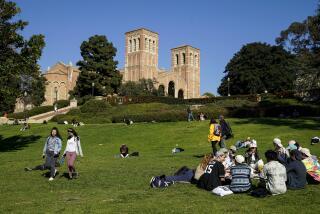Proposition 8 trial turns its attention to children
The well-being of children reared by same-sex couples dominated the federal trial over Proposition 8 on Friday as the measure’s proponents attacked studies that showed children of lesbians and gays fare well.
Lawyers for two gay couples challenging Proposition 8’s ban on same-sex marriage called to the stand Michael Lamb, head of Cambridge University’s Department of Social and Developmental Psychology.
Lamb reviewed about 100 studies that compared children of gay families to those reared by heterosexual couples.
“The evidence makes clear that having a gay and lesbian parent does not make children more likely to be maladjusted,” Lamb testified.
He also said children reared by gays weren’t more likely to become gay than other children, but were more likely to be teased about their families by other children. Children of same-sex couples also have fewer sexual stereotypes, such as viewing a nurse as female and a doctor as male, Lamb testified.
An attorney for the Proposition 8 campaign cross-examined Lamb for hours, questioning the methodologies of some studies and portraying him as a “committed liberal.”
Attorney David H. Thompson said that many of the studies Lamb read focused on lesbian parents, not gay men, and cited a study that found children of gays fared worse than those of heterosexuals. Lamb called that study “a complete outlier from the rest of the research” and one whose authors had admitted was faulty.
Thompson said 2000 census data showed that 33% of lesbian households and 22% of gay male households were raising children.
In other testimony, Helen Zia, 57, a lesbian writer, told the court that marrying her partner transformed the way their families viewed them.
Zia said she knew as a girl that she never wished to marry a man, suspected she was gay in college and was in her 30s when she had her first relationship with a woman.
She recalled her “lesbian trial” when she was working with other community organizers in Asian and African American communities to end job discrimination. She said her co-workers told her their communities disapproved of homosexuals and asked her if she was a lesbian. Zia, then 23, told them she was not.
“I had stepped in the closet and slammed the door shut,” she said. She later burned years of diaries in which she had written of her attraction to women.
She said she eventually fell in love with Lia Shigemura and quit a high-powered job to move across the country to be with her. Before marrying, they were domestic partners. Zia said her domestic partnership with Shigemura was nothing like marriage. Marriage united the families of both women and gave their relationship a name that others understood, she said.
After marrying, she recalled, her teenage niece told Shigemura, “Auntie Lia, now you’re my real auntie.”
A Proposition 8 lawyer suggested Zia was a gay activist and noted she had once criticized marriage as “patriarchal.”
More to Read
Get the L.A. Times Politics newsletter
Deeply reported insights into legislation, politics and policy from Sacramento, Washington and beyond. In your inbox three times per week.
You may occasionally receive promotional content from the Los Angeles Times.







